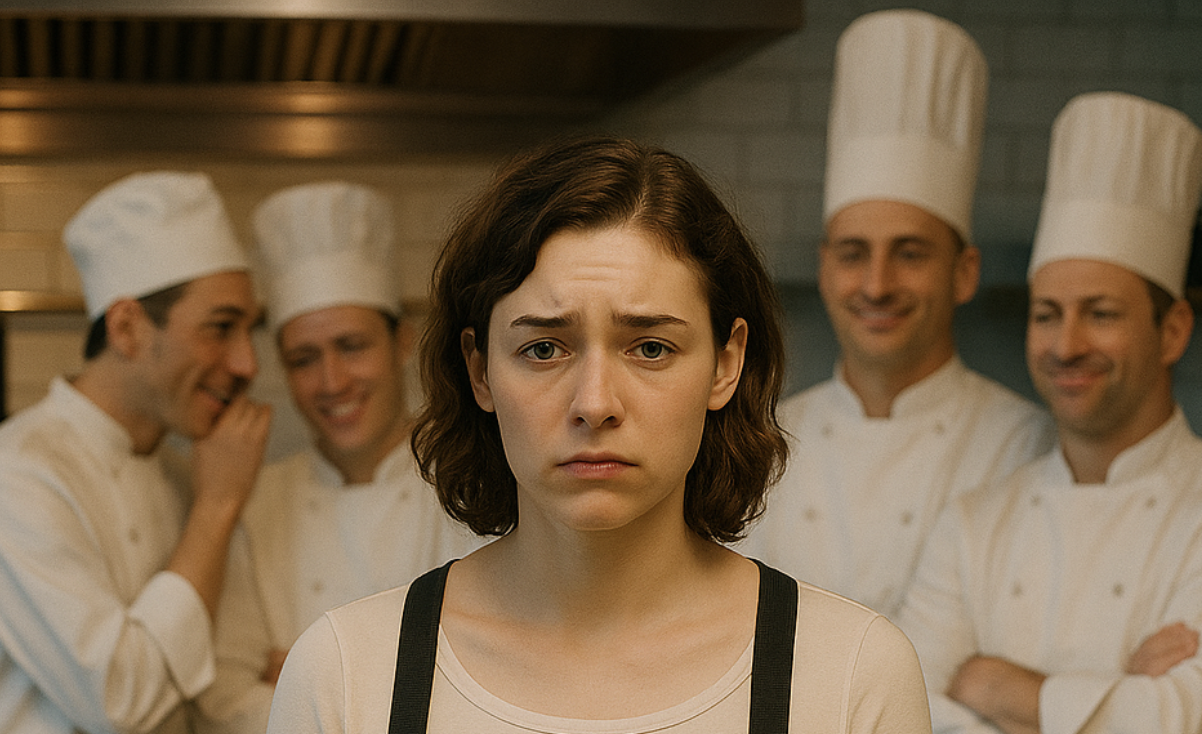She entered the hall filled with the hum of voices, the clinking of dishes, and the shuffling of waiters between tables. Everything around was buzzing—as if the restaurant were a living creature, pulsing in time with the clock. And she—a quiet shadow amid the chaos.
She wore a simple dress without any fancy patterns, her hair neatly tied in a bun, a barely noticeable, almost shy smile on her face. She didn’t attract attention. No one even looked back. Just another temporary worker called in to “help in the kitchen” while the main chef was sick.
“Do you even know how to cut?” the manager threw at her without stopping, handing out orders like bullets from a machine gun.
“A little,” she replied, lowering her gaze, trying to blend into the background.
The kitchen was a real circus: chefs darted between stoves like magicians, balancing control and chaos. The dishwashers barely managed to wipe glasses, and in the dining room, people had already started whispering discontentedly—orders were delayed, customers losing patience.
“Alright, make a salad!” the head chef barked, pointing at a pile of vegetables. “Quickly! This isn’t an exhibition, it’s a restaurant!”
She silently took the knife.
And then…
Her fingers gripped the handle with such confidence, as if they had known this tool all their lives. The blade slid smoothly, like an extension of her own hand. One stroke—and cucumbers turned into thin, paper-like slices. Another—and tomatoes became ruby-red wedges. The pepper was diced into neat cubes as if cut with a ruler.
“Hey…” one of the chefs called out, frozen with a pot in his hands. “Who’s that over there…?”
But Isabelle was already moving on. Unhurried but precise. Every movement deliberate, every second used to purpose. Sauces blended with clockwork precision, oil heated to the perfect temperature, meat fried just enough to achieve the ideal juicy taste. The aromas floated through the kitchen—deep, rich, mesmerizing. They seemed to touch the skin, awakening memories of home, celebrations, first feelings.
“What is that smell?!” a voice exclaimed from the dining room.
The manager, hearing this, rushed out from behind the counter, looking around in astonishment. What he saw stunned him: the kitchen that a minute ago had been a battlefield now looked like a stage before a magnificent performance. The chefs stood frozen, like an audience before a show.
“Who… who are you?” he finally blurted.
Then she raised her eyes for the first time. There was no fuss or fear—only quiet confidence. And in that gaze slipped something more. Like an awakening.
“Isabelle Moreau. Head chef at Le Ciel Étoilé. Three Michelin stars.”
The hall fell silent. Silence hung in the kitchen. Even the air seemed to stop.
The guests demanded “that very dish,” the one that gave off such an incredible aroma. The chefs clustered around the sink, trying to memorize every step, every motion. The manager, red with embarrassment, muttered apologies, not knowing what to do with his hands.
“We… we didn’t know… Sorry…”
“It’s alright,” Isabelle replied gently, removing her apron. “Sometimes even stars need to remember what it’s like to be just human. And to cook for the love of the process itself.”
And, leaving behind a wave of amazement and reverence, she walked out of the restaurant as if leaving the stage after the final act.
Outside, a young waiter—Marco—caught up with her. He was running, out of breath, with a paper napkin in his hand, hastily scribbling a phone number.
“Chef, wait!” he shouted. “I recognized you! You’re Isabelle Moreau! The one who closed her restaurant after Duval’s review!”
She stopped. The wind tousled her hair, and a flash of pain flickered in her eyes—brief as a lightning strike at night.
“Yes,” she said quietly. “That’s me.”
Marco swallowed.
“But why did you come here? To this ordinary, unremarkable restaurant?”
Isabelle slowly turned to him. Her voice was calm, but there was steel in every word.
“Because tonight Lucien Duval is dining here.”
Meanwhile, in the hall, at the window table, sat the very critic—the man whose article had once destroyed an entire career. Lucien Duval, with his famous ability to make or break a name with a single sentence. He ordered a steak, sneering at the menu, considering everything around provincial and second-rate.
But suddenly his nostrils twitched.
“What is that aroma?!” he hissed, grabbing the passing maître d’. “Where is that coming from?!”
“That’s the new chef, monsieur… she…”
Duval didn’t wait to hear more. He snatched a fork from a neighboring guest, took a piece from their plate, and put it in his mouth.
And…
His face turned into a mask of conflicting emotions: first confusion, then rage—and finally, animal admiration.
“This is… impossible…” he whispered, grabbing the next dish.
A few minutes later, he stormed into the kitchen like a hurricane.
“Moreau?! You cooked this?!” he shouted, his voice trembling.
Isabelle, already packing her bag, slowly turned around. She crossed her arms over her chest, looking at him with cold dignity.
“So, Lucien? Still think my kitchen is a ‘flavorless spectacle’?”
The critic gasped for air. His fingers clutched the notebook as if his life depended on it.
“I… I was wrong. You… you’re a genius.”
Chefs, dishwashers, waiters—all froze, not believing their ears. Who would have thought Lucien Duval would admit his mistake aloud?
Isabelle stepped forward, took a spoon, and offered it to him.
“Try again. But this time—without prejudice.”
He took it. Tasted. And… he cried. Like a child who was given back what was lost.
The next morning, the country’s largest newspapers published Duval’s article under the headline:
“Forgive me, Isabelle. You are a deity.”
And Marco, the very young waiter, received his first lesson in his new life—from the master herself.
The restaurant where it all began is now booked for three months in advance. And if you want to try that very dish—you’ll have to be patient. Because stars don’t shine just for nothing. They light the way for others.



